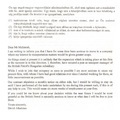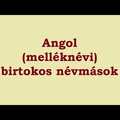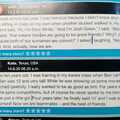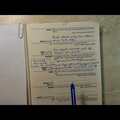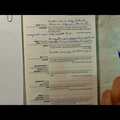– 4. óra –
KÉRDŐSZAVAK
WHAT?
What is your name?
What is your favourite (colour)?
What are you wearing?
What is it like?
I have a house. – What is it like? – It’s big. It has eight rooms. – It has a garden. – It’s white.
What is the time? = What time is it?
What time?
WHERE?
Where do you live?
Where were you born?
Where do you work?
Where are you from?
Where are we?
Where is my bag?
Where are your shoes?
Where are we going?
Where is it?
WHERE + (dolog neve)
WHO?
Who are you?
Who is it?
ACTOR
Who is your favourite actor?
WITH
Who do you work with?
Who do you live with?
Somebody called you. – Who?
WHICH? (≠ witch)
Which do you want?
Which do you like?
Which is the best?
Which is the cheapest?
Let’s meet! – Which day? What time?
WHEN?
When were you born?
When is your birthday?
When do you work?
When do you start?
When do you finish?
When is it?
When is it good for you?
Why…? – Because… .
Why do you want to learn English?
Because it is useful.
Why do you work here?
Why do you eat this?
Why is it here?
Why are you happy?
Why are you sad?
Why don’t you come shopping with me?
Come shopping with me!
Why don’t you stop smokig?
WHOSE?
Whose films do you like?
Whose music do you like?
Whose is it?
Whose book is it?
HOW
How do you like coffee?
How do you do that?
How do you make coffee?
How do you cook soup?
How can I help? / Can I help you? / Need help?
How can I find the hospital? = Where is the hospital?
How hot is it?
How big is it?
How far is it?
How expensive is it?
How much is it?
How many?
How many rooms has it got?
It has eight rooms.
How many children have you got?
SITUATUIONS
- TRAVELLING TOGETHER
What’s you name?
Where do you go?
Where are you going?
Where do you live?
What’s your job?
Do you have enough room?
Do you smoke?
- AT A CAFÉ
What would you like?
Coffee and water.
How much?
A glass.
Would you like milk or sugar?
Milk and sugar, please.
Anything else?
No, thanks.
Waiter! The bill, please!
- MARKET PLACE
What would you like?
How much is that?
Bag? (Where is a bag?)
There.
How many? / How many do you want?
A kilo.
Half a kilo.
A quarter of a kilo. = 250 gramms.
a couple
a dozen (=12)
one or two (1-2)
some
This much?
Enough.
potion
piece
packet
bag
bottle
boksz
jar
can
- HOTEL
What is your name?
I would like to ask for my key.
Door seventeen. = Room 17.
- ON A HOT BUS
Please.
Excuse me!
It is hot in here!
Please, turn on the air-conditioning.
Please, switch on the air-conditioning.
- LOOKING FOR A POST OFFICE
Excuse me. Where is a post? I need a post. (=Is there a post near here?)
There is a post near here.
Where is it?
Where is it on the map?
Show it on the map!
straight on
Go straight here to the second corner, then turn right and the post is at the first corner.
– 5. óra –
Do you have a ___ in your ___?
1.
- Do you have a big bed in your bedroom?
- Yes.
- What is it like?
- My big bed is new.
2.
- Do you have a comfortable bath in your bathroom?
- Yes.
- What is it like?
- My comfortable bath wide and pink.
3.
- Do you have a dishwasher in your kitchen?
- Yes.
- What is it like?
- My dishwasher is modern and useful.
4.
- Do you have a TV in your living room?
- Yes.
- What is it like?
- My TV is new and flat.
5.
- Do you have a bench in your garden?
- Yes.
- What is it like?
- My bench brown and wide. (≠ white !!)
How big (is it)? – This size.
How many do you have?
What shape (is it)? – This shape.
COOK
I cook every day.
I cook soup. (≠ soap!! )
I am not a cook.
I want to cook scrambled eggs. (RECIPE = recept)
I need some eggs, oil, onions, mushrooms, tomatoes, paprika, salt, pepper, potatoes, bacon, sausage, cheese, etc. (et cetera = stb.)
First, cut the vegetables!
Then, pour oil into a pan.
Then, put the vegetables into the hot oil.
Heat then for some time.
When the vegetables are soft, put the sausage or ham or bacon into it.
After that pour the eggs on them.
Scramble it for some time. (scramble = mix)
When it is ready, take it from the cooker. (cooker ≠ fire place /:open fire, camp fire)
PUTTING THINGS IN ORDER (= dolgok rendbe rakása)
Put the ___ (into/in /on) the ___ !
The ___ (go/goes) into/in/on the ___ !
Put the socks into the laundry.
The book goes on the shelf.
Put the towel into the bathroom. = The towel goes into the bathroom.
Put the plates into the cupboard. = The plates go into the cupboard.
Put the flowers into the vase. = The flowers go into the vase.
Put the shirts into the wardrobe. = The shirts go into the wardrobe.
(shirt ≠ skirt ≠ shorts ≠ T-shirt!)
(Részmennyiség kifejezése: „valamiből valamennyi”)
I need 6 eggs.
I need A BOX OF eggs.
I need A DOZEN eggs.
I need HALF A DOZEN eggs.
a bottle of oil
a litre of oil
a kilo of potatoes
2 kilos of potatoes
a slice of ham
a slice of cold cuts
a pair of sausage
a packet of (spice)
a bag of (spice)
a tin of mushrooms
a jar of mushrooms
Fogalmazás, a más megismert egyszerű mondatok segítségével.
(Az első mondatokkal már foglalkoztunk – a második mondat az első szerkezetére épül):
This airport is very modern. – This bag is very old.
Peter is American. – My friend is not Hungarian.
I've got two arms. – I’ve got two legs.
My bag is light. – My box is yellow.
The bath is in the bathroom. – The dining table is int he kitchen.
The bed is in the bedroom. – The wardrobe is int he living-room.
John's got a bicycle. – Bob’s got a car.
My house is very big. – My shoes are nice.
The bird is singing. – Mum is cooking.
Happy birthday! – Happy nameday!
He likes black coffee. – I like white coffee.
The sky is blue. – My car is white.
The books are on the shelf. – The chairs are int he room.
John is a nice boy. – Kate is a nice girl.
I eat bread for breakfast. – I eat a roll for supper.
I often take the bus. – I never take the train.
Butter is in the fridge. – Oil is int he pantry.
I buy bread at the baker's. – I buy meat at the bucher’s.
My camera is new. – My favourite bag is old.
The car is in the garage. – The letter is in the envelope. The table is int he living-room.
There's a cartoon on Tv. – Where is the table? – The table is in the living-room. – What is there int he living-room? – There is a table in the living-room.
My cat is called Muffin. – My dog is called Buksi.
This chair is comfortable. – This chair is old.
Mice like cheese. – Cats like mice.
The museum closes at five. – The shop closes at 6.
It's cold in winter. – It’s hot in summer.
My father cooks on Sundays. – My mother cooks every day.
Mrs Parker's got three daughters. – Mr. Smith has four sons.
– 6. óra –
- The window is not broken.
- Go out, please!
- Go up, please!
- Go down, please!
- My grandmother is a happy woman.
- My grandmother likes dogs.
- Cats eat milk.
- The roads are white in winter.
- My mother’s got short hair.
- My sister doesn’t like eggs.
- They’re shaking their heads.
- I’ve got backache.
- I’ve got stomacheache.
- It’s windy in spring.
- They live in a flat.
- I hurry int he morning.
- I eat when I’m hungry.
- I drink when I’m thirsty.
- I drink hot tea in winter.
- I work at work.
- I am int he kitchen when I cook.
- Where’s the toilet?
- There’s a chair near my table.
- I leave my workplace at 4.
- I finish at 4.
- I cook every day.
- I’m cooking now.
- I’ve broken my left arm, but I haven’t broken my right arm.
- I’m reading my friend’s letter.
- Look at that big house!
- Sue is my friend and not my girlfriend.
- I eat fruit for breakfast.
- When can we meet? Tomorrow?
- It’s nice to talk to you.
- Postman delivers letter and bills.
- I will deliver this envelope later.
- He will arrive sooner or later.
- He’s got a lot of time.
- Her husband drives her to the cinema.
- Drive me there!
- I’ll drive you to the shops.
- I saw a piece of cheese in the mouse’s mouth a month ago.
- Is your glass full? – No, it is emnpty.
- My pocket is full; his pocket is empty.
- I have a packet (of chewing-gum) in my pocket.
Elöljárók gyakorlása:
- „I can’t live with or without you.”
- I need a glass of water.
- I live in this town.
- I work more in summer.
- I was born in May.
- I was born in 1973.
- I live in a house.
- I will be there in two hours.
- I see a picture in a book.
- I learn English on Wednesday.
- I don’t work on Saturday.
- My pen is on the table.
- New Year’s Day is on 1st of January.
- I go to sleep at 10.
- We meet at Xmas (=Christmas) and at Easter.
- He is at work.
- Children / Students learn at school.
- Go out of the room!
- Don’t jump out of the window!
- Put the book into the box!
- Don’t run into the room!
- Between you and me, your room is very dirty!
- The table is between the chairs.
- We learn English between 4 and 7.
- I want coffee with sugar, without milk.
- What is the matter (= problem) with you?
- What’s the matter?
- I can’t eat the soup without salt.
- I see a car in front of (≈ opposite) the house.
- The garden is behind the house.
- What is behind me?
- I go to work by car.
- We learn English from 4 to 7.
- I want to drink a coffee.


